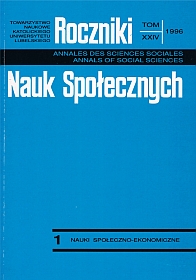Marriage and Cultural Models of Love
Abstract
Mariage has been a fundamental social fact studiet by sociologists ever since it became the focus of the family formation. Modern sociologists: M. Weber, F. Znaniecki, T. Parsons, N. Luhmann all affirm H. Spencer's view on the supremacy of the monogamic marriage both from the point of view of the social system and the point of view of ethics. Marriage is a factor of rationality and order within the social system. Love has been at the core of socio-structural transformations resulting in the autonomization of intimate relationships and along with this process the institution of marriage has weakened. Love is a cultural phenomenon as a generalized symbolic medium of communication. Common features of the erotic love relation inherent in those communicative codes are compared with characteristics of the marital relations. To understand the precariousnes of the contemporary marriage pattern one needs to follow the analysis of the interaction between marital and love relation, the transformation of the social system and dynamics in the semantics of love (changing cultural meanings).
The evolution of marriage toward the intimate relationship results in its instability. On the other side the aktruistic semantics of love has been deconstructed. The crisis of marriage is thus related to both the structural and the cultural deficits.
Copyright (c) 1996 Roczniki Nauk Społecznych

This work is licensed under a Creative Commons Attribution-NonCommercial-NoDerivatives 4.0 International License.


